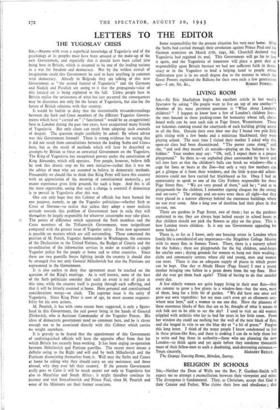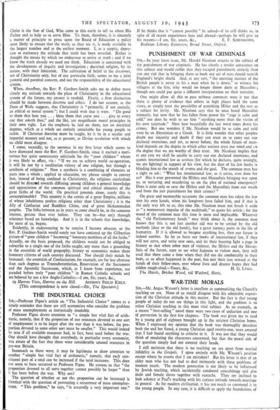RELIGION IN SCHOOLS
Sm,—Neither the Dean of Wells nor the Rev. P. Gardner-Smith will expect me to attempt a reconciliation between their viewpoint and mine. The divergence is fundamental. They, as Christians, accept that God is their Creator and Father, Who claims their love and obedience ; that
Christ is the Son of God, Who came to this earth to tell us about His Father and to help us to serve Him. To them, therefore, it is sincerely a matter of principle to press upon the Board of Education a policy most likely to ensure that the truth, as they see it, is made available to the largest number and at the earliest moment. I, as a sceptic, depre- cate as stationary the attitude that truth has been revealed. Rather is thought the means by which we endeavour to arrive at truth ; and if we know the truth already we need not think. Education is concerned with the development of inquiry and investigation ; doctrinal religion, by its nature, with their limitation. The cultivation of belief in the doctrines, not of Christianity only, but of any particular faith, seems to me a joint pastoral and parental concern, and not the responsibility of the educational system.
When, therefore, the Rev. P. Gardner-Smith asks me to define more closely my attitude towards the place of Christianity in the educational system of the future, my answer is twofold. Firstly, a firm distinction should be made between doctrine and ethics. I do not assume, as the Dean of Wells suggests, that Christianity is " primarily, if not entirely, an ethical or moral system "; but I could wish that it were. " Do good to them that hate you . . . bless them that curse you . . . give to every one that asketh thee," and the like, are magnificent moral principles in their own right. Let the emphasis be laid on them, not on doctrinal dogmas, which as a whole are entirely unsuitable for young people to tackle. If Christian doctrine must be taught, let it be in a secular and impartial manner and not, as at present, as Divine revelation with which no child must disagree.
I come, secondly, to the sentence in my first letter which seems to have dismayed most the Rev. P. Gardner-Smith, since it excited, a meri- torious but quite unnecessary solicitude for the " poor children " whom it was likely to affect, viz.: " If we are to achieve world co-operation, it will be not by a totalitarian victory of one religion, but through a synthesis of religions." Now a synthesis is a combining of elements or parts into a whole ; applied to education, my phrase sought to convey that, instead of being confined to .Christianity, the religious curriculum should be directed towards diffusing among children a general knowledge and appreciation of the common spiritual and ethical elements of the great faiths of the world. On practical grounds alone, surely this is unexceptionable? This country is the centre of a great Empire, millions of whose inhabitants profess religions other than Christianity ; it is the Ally of Confucian and Buddhist China, and of great Mohammedan peoples. The links between us in years to come should be, in the common interest, greater than ever before. They can be—but only through tolerance based on knowledge. And it is in the schools that knowledge, for most of us, begins.
Evidently, in endeavouring to be concise .I became obscure, or the Rev. P. Gardner-Smith would surely not have conjured up the Gilbertian picture of " poor children " becoming " honorary members of all the faiths." Actually, on the basis proposed, the children would .not be obliged to subscribe to a single one of the faiths -taught, any more than a grounding in the essentials of world geography, history or economics makes them honorary citizens of each country discussed. Nor should their minds be bemused: the essentials of Confucianism, for example, are far less abstruse than such dogmas as Transubstantiation, Reservation of the Sacrament and the Apostolic Succession, which, as I know from experience, are paraded before truly " poor children " in Roman Catholic schools and are beloved by not a few Anglo-Catholics.—I am, Sir, yours, &c.,
19 Harrow View, Harrow on the Hill. ANTHONY PHILIP KIELY. [This correspondence is now closed.—En., The Spectator.]



























 Previous page
Previous page